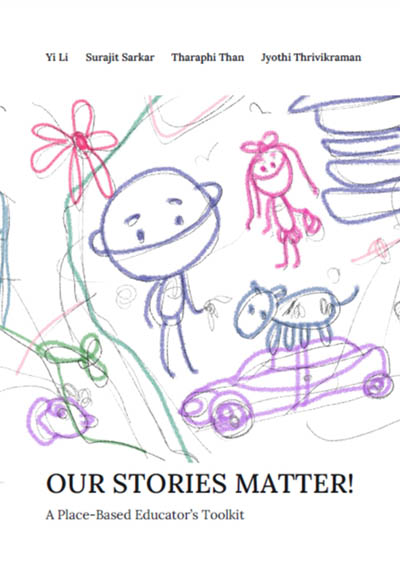From inter-regional collaboration to global resource: The Story Behind "Our Stories Matter!"
"OUR STORIES MATTER! A Place-Based Educator's Toolkit" is the result of a project that began with the spontaneous collaboration between researchers from various partner institutions of the IIAS Humanities Across Borders programme. Initially developed for and with educators from Myanmar, the toolkit is helpful for all educators interested in integrating place-based education and storytelling into their pedagogy.

Download the book for free:
humanitiesacrossborders.org/resources/our-stories-matter
"OUR STORIES MATTER!" emerged from the teaching challenges faced by university educators in Myanmar following the 2021 military coup. Conceived initially to address the specific circumstances of Burmese educators, the toolkit's personal stories are from teachers in Myanmar. The translation, illustrations and design are by Burmese youth eager to contribute to the project. The toolkit's methodology, however, has broader applications across diverse educational contexts, including institutions in the Global North.
Focusing on collective storytelling as pedagogy, the toolkit comprises nine story prompts or chapters that guide educators in building stories from their own lived experiences, whether of a name, a place or space, an image, an object, a thing, or the practice of listening, walking, or mapping. In the words of one of the participants, "…it was really helpful to learn how to facilitate and find local stories from everyday life. For example, my place is the fourth most conflict-ridden in the country right now…. I've always thought of including such information in stories so it can become a part of history one day."
The book's subtitle, "A Place-Based Educator's Toolkit," reflects its core methodology: education informed by learners' situational contexts and lived experiences. The methodology proves particularly valuable in situations where:
- Educational work faces disruption from conflict or other precarities
- Institutional mandates for fostering creative and critical thinking are compromised or suppressed.
- Decolonising curricula and pedagogies becomes necessary in institutions using materials that fail to reflect local experiences in a world where the Global North and South both contain knowledge and views about the world that are intertwined but not yet equally valued.
Broader applications
Beyond conflict zones and postcolonial contexts, the methodology offers significant value in other educational environments, including in the Global North, where it can serve as an effective instrument for teaching about foreign cultures or examining themes that span multiple regions. Work like this has already begun with IIAS partners, connecting Myanmar students with those in Europe and collaboratively studying and understanding the social factors that affect health.
Universities can employ this method to enrich their existing curricula by connecting academic content to the lived realities of people within the regions and cultures under study, enabling the next generation of students, scholars, and working professionals to better navigate the increasingly globalising world around them through their own stories and the stories of those they will work alongside.
How did the toolkit come about?
What began as a shared interest in pedagogies beyond the classroom, this place-based educators toolkit is an outcome of a collaboration between researchers from IIAS's Humanities Across Borders (HAB) network, namely Tharaphi Than (Northern Illinois University (NIU), USA), Jyothi Thrivikraman (Leiden University College (LUC), Netherlands), Yi Li (Aberystwyth University, Wales), and Surajit Sarkar (Oral Historian, India).
Personal accounts and testimonies of several displaced educators from Myanmar, brought together initially online and then later in person at a workshop in Chiangmai (with the support of the Thinking Classroom Foundation, Chiang Mai, Thailand and the Regional Centre for Social Science and Sustainable Development (RCSD) of Chiang Mai University), form the basis of this educator's toolkit.
To read more about the "Our Stories Matter!" toolkit, see:
- The Newsletter 98 Summer 2024
Place-Based Education and Community Storytelling - Humanities Across Borders Blog
Sharing Stories That Matter: Reflecting on Myanmar Underground Educators - Humanities Across Borders Resource
Leveraging Collaboration for Social Determinants of Health Pedagogy Through Virtual Learning and Multidisciplinary Integration
The Humanities Across Borders programme (HAB) is initiated and coordinated by the International Institute for Asian Studies (IIAS) with support from the Mellon Foundation and partner institutes.